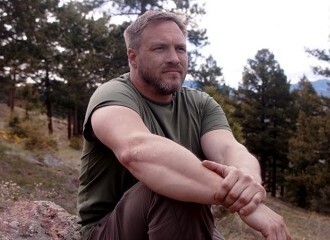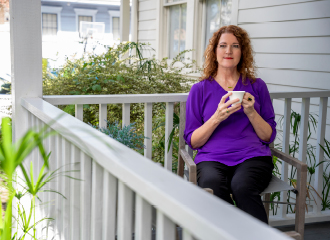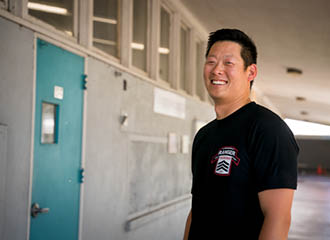Then & Now: Army Veterans Share Their Mental Health Evolution
5-minute read
Then & Now: Army Veterans Share Their Mental Health Evolution
5-minute read
Tending to and improving mental health is a process; change doesn’t occur overnight. Army Veterans Schuyler, Michelle, and Dennis talk about their personal evolution, from their time in service to their lives today, and the mental health treatments that changed their lives between then and now. They also share what they want other Veterans to know, based on what they learned from their journeys.
Schuyler: Reaching the summit
Then
Schuyler joined the U.S. Army in 2003, serving in the infantry. By the time he left the Army in 2009, he had deployed twice to Iraq, experiencing mortar attacks and witnessing casualties. He estimates his vehicle got blown up directly or indirectly more than a half dozen times.
His transition to civilian life was rough. “I think the overall experience of being in a combat zone stays with you forever,” the Veteran says. “I found that I was having trouble controlling my emotions sometimes, my anger.”
He also experienced hypervigilance, depression, and unhealthy drinking. And without his Army buddies around, he didn’t feel like he had people he could hang out with and talk to.

Checking back in
Now
Schuyler embraces life. He returned to school and earned a degree in psychology from the University of Colorado. With his children involved in youth sports, he began coaching. And he engages in his passion for the outdoors with activities such as summiting mountains.
“To do something you think you can’t do and accomplish that task is mind blowing,” he says.
How he got there
Schuyler says going to VA for help was one of the best decisions he ever made. He learned he had suffered traumatic brain injury (TBI) from all those blasts, and he learned ways to manage TBI’s symptoms and his other mental health challenges.
“It was ultimately therapy, introspection, that made me realize that if you’re unhappy, acknowledge those feelings,” he says. “Don’t run from them. Do the right thing, do the courageous thing, engage it, and fix it.”
Schuyler notes that taking care of his mental health is an ongoing process, but he’s proud of how far he’s come. “Therapy made me a better person,” he says. “It made me a more emotionally mature person, but it also made me a happier person. And that made me a better dad.”
Michelle: Dancing in the streets
Then
Michelle served in the U.S. Army as a tank-automotive maintenance materiel manager from 1990 until 1998. During that time, she married another commissioned officer, and they served as company commanders together.
After Michelle left the Army, at age 28, she realized how much she missed its structure and the credibility she had earned. “Transitioning from the military was a lot harder than I anticipated,” she says. “I had already been in charge of quite a bit and had a lot of leadership experience, and I grieved it in a way.”
Both Michelle and her husband had a hard time finding where they fit into the civilian world, and they divorced. At times, Michelle would feel numb, start isolating herself, and find it difficult to finish projects and focus.

Counseling Helps This Veteran Cope With Depression Symptoms
Now
One of her joys is a dance troupe she joined called Disco Amigos, which participates in Mardi Gras parades and other social events and performs around New Orleans. “We bring disco, keep disco alive,” she says. Michelle says belonging to the group underscores to her the importance of community.
“You don't always choose your family, but you can make your own family,” she says.
She also takes pride in being a woman Veteran—the fastest growing group of Veterans in the U.S.—and encourages all Veterans dealing with everyday challenges to reach out for support.
How she got there
Michelle’s experience with mental health care didn’t start smoothly: She says it took her a while to find a counselor that she felt really understood her. But once she found the right match, she made steady progress. She also became a regular user of VA women’s health services; she especially appreciates the dedicated women’s clinics.
Diagnosed with depression and anxiety, Michelle started on medication and benefited most in counseling from cognitive behavioral therapy (CBT). What did CBT teach her? “Really just to feel the feels,” she says. “To stop trying to avoid that so quickly or, if something negative comes up, to try to numb or avoid.”
Michelle still has times when she feels malaise and other symptoms coming on, but she has the self-awareness to revisit counseling. “I like to call them my tune-ups,” she says.
Dennis: Training his mind and body
Then
Dennis served in the Army from 2001 to 2005 in light infantry airborne. Guided in part by his brother, who had already been serving for 2 years, he joined a Ranger battalion—a unit within the Army's 75th Ranger Regiment, a special operations force. His unit was involved with the capture of Saddam Hussein during the Iraq War in 2003.
“When we accomplished that mission, it was a pretty elating moment for all of us,” he says.
After Dennis finished his military service, however, the feeling of being in a combat zone stayed with him. He often felt combative and aggressive.

“I wasn't ready.” Army Veteran Discusses PTSD and Being Open to Healing
Now
Dennis says his relationships with his wife and daughter have strengthened because of their involvement in his healing process. He and his brother became more open and supportive of each other’s mental health, and together they opened a tae kwon do studio, using their martial arts passion to fulfill a dream to create something for themselves.
Through the studio, Dennis says he’s helping kids become better athletes and better people—and also helping himself. “It’s a healthy outlet,” he says. “In my past I think I found outlets that weren’t as healthy.”
How he got there
For almost 10 years, Dennis resisted the need for help and didn’t recognize the source of his symptoms. “I just felt like I was a kind of angry and grumpy guy,” he says. His brother again exerted an influence, encouraging him to seek help and visit a Vet Center to get started.
“My first experience with treatment was sitting down with my counselor, and him educating me with what PTSD [posttraumatic stress disorder] was,” he recalls. “It wasn't him convincing me. It was me just kind of realizing, ‘Oh, that’s what PTSD is.’”
Dennis says he learned through individual and group therapy how to respond when his emotions become heightened. “You identify the triggers, you identify why this is happening, and then you can kind of train yourself to ground yourself back to a normal state,” he says.
Looking back on his decade of resistance, he advises other Veterans: “You’re not going to be able to heal from a particular issue unless you address it. ... It’s not a negative thing to try to seek treatment to, to better yourself, to make yourself a better person.”

